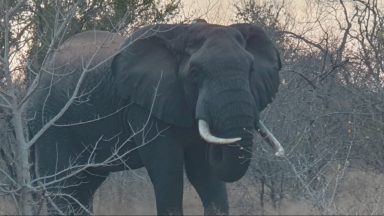Sea turtles are an ancient species believed to have been around for the past 110 million years. Although these marine reptiles have had a long history, their future doesn’t look quite as durable as their past, with six out of the seven species found throughout the world being listed as endangered or even critically endangered, according to the International Union for Conservation of Nature (IUCN). Thankfully, many organisations and individuals have dedicated their lives to helping reverse the plight of endangered species such as turtles, and in Maputo National Park, wildlife vets from the Mozambique Wildlife Alliance are nursing a sick green turtle back to health.
This female green turtle was found by one of the diving concessions who operate off the coast of Ponto do Ouro in Mozambique. As the boat approached the turtle, she made several attempts to dive underwater but it soon became obvious that something was wrong. Thanks to a quick response and collaborative efforts from diving operators, Gozo Azul Dive Centre and Dolphin Centre, the turtle was rehabilitated in a safe environment. After 24 hours, she was assisted by Maputo National Park’s marine rangers, and was placed in the capable hands of the Mozambique Wildlife Alliance team, who sent her for X-Rays to diagnose what was wrong.
It has now been a week since the turtle has been taken in, and Hannes van Wyk, Peace Parks Foundation aviation manager and chief pilot, takes us with him to get an update on the turtle’s progress. Wildlife vets Dr Hagnesio Chiponde and Dr Hugo Pereira explain to Hannes that recent X-Rays indicate that the turtle has pneumonia. Despite her improved condition, the team will need to assess her daily to determine when she may be ready for release.
According to Hugo, their metabolisms are slow, and their diet varies depending on their age. As youngsters, sea turtles tend to have more of a carnivorous diet including species such as shrimp and squid, but as they start to mature, their diet turns more towards the vegetarian side, and they prefer greens such as seagrass. Estimating that this turtle is between 35-40 years young, the Mozambique Wildlife Alliance team is doing all they can to speed up her recovery.
As a predator, scavenger, competitor and host, turtles play an important role in the health of the marine ecosystem. Older green turtles, such as the one seen in the video above, primarily graze upon seagrass beds, which helps the grass grow back quicker and healthier, making it a favourable nursery ground for many smaller marine organisms. Additionally, seagrass beds are important for providing oxygen as well as being a vital carbon sink within the ocean.
Maputo National Park plays a critical role in the protection of turtles, supporting around 80% of the critically endangered leatherback and loggerhead turtles who visit Mozambique’s coastline every year to nest. Although it’s important for nature to take its course, Peace Parks Foundation recognises that human intervention is necessary for endangered species such as these, whose numbers have dramatically decreased at the hands of humans.
Click here to watch another turtle rescue by the Maputo National Park rangers!

